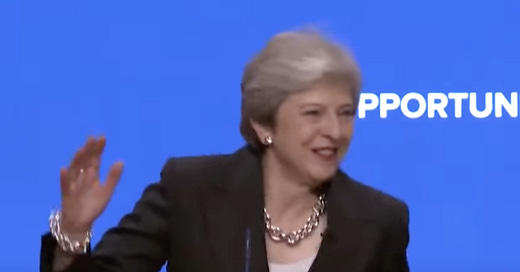There is no more intellectually incurious a person than the average Conservative politician. All they care about, in work, are status and process — fuelled by their inner drives for self-advancement and clubbishness.
I can’t comment on Theresa May as a woman. As a politician, though, she is no different. Her natural awkwardness is an unthreatening veil for an hard-edged ego.
The former prime minister — whose achievements in office truly had no beginning — is on a comeback tour, peddling a book called The Abuse of Power. If I’d been her, I wouldn’t have written a book with that title and then put my face on the cover. It’s not quite as bad as if I plastered my ugly mug across a book called 100 Infamous Serial Killers but…
Rory Stewart and Liz Truss have books coming as well. Call me a cynic but it looks a bit like Conservatives are realising that their party’s sentence will be handed down next year and are frantically distancing themselves from the crimes.
May is trying to elevate herself above Conservative politicians like Truss and Boris Johnson by exploiting good old-fashioned recency bias. She is also trying to portray herself as being more nice. I suspect she is more nice on a personal level. She seems like it. (Granted, being nicer than Boris Johnson is not one of life’s more titanic achievements). But “niceness” in politics can amount to little more than the bland acceptance of fashionable opinions.
May declares herself to be “woke and proud”. What does this mean? It means that she’s looked up “woke” in the dictionary and decided that it refers to “somebody who recognises that discrimination takes place”.
I recognise that discrimination takes place. This is like saying that a socialist is someone who wants to help people, or that a conservative is someone who protects good things. Who doesn’t it apply to? We could argue all day about the meaning of “woke” but I think a minimal definition is that it entails that most societal disparities are the result of social constructions which should be reformed if not revolutionised. Does that apply to you, Ms May?
The “polarisation of politics” is one of May’s bugbears, as well as that of every other veteran managerialist. May thinks that “polarisation” has infected the gender debate, telling Times Radio:
It’s an issue on which what we want is calm reflection and consideration. It’s been polarised and very polarised and I think actually it shouldn’t be.
It should be one where we can sit down together. There will be people of different views but...we need to think about the people who are involved here and have a sensitive approach to them rather than taking these polarised positions.
I think “polarisation” has got an undeservedly bad rap. To be clear, it isn’t good if two camps disagree on everything — because neither is going to be right all the time — and it isn’t good if people can’t be friends across divides. Chesterton and Shaw had a warm relationship after all.
But sometimes “polarisation” means that different people have incompatible ideas, with one of them being right and one of them being wrong. And that is in fact unavoidable in life. People who don’t have ideas are tempted to suspect that some sort of compromise must be achievable — but that is not always the case. Either there is life after death or there is not. Either aliens exist or they do not. Either biological males can actually be women, and biological females can actually be men, or they cannot. There are associated questions on which compromises might be found. But there are some questions on which people must prevail.
Other questions might not have plain old factual answers but still pit such divergent moral perspectives against one another that compromise is a pipe dream. I’m as liable to find a happy compromise with Kehinde Andrews on race, or Brian Caplan on immigration, or Sophie Lewis on the family as I am to fit my head through the holes of a sieve. Granted, these are extreme positions. Perhaps the point is that we should be finding people closer to the middle. But sometimes that “middle” still features gaping distances between people. And sometimes that “middle” is flat-out wrong. For all I disagree with Kehinde Andrews, Brian Caplan, Sophie Lewis, at least they have principles. People who fundamentally renounce “polarisation” project their own lack of intellectual conviction onto everybody else.
Ah, poor Conservatives. It’s all very well to be obsessed with status and process but at a certain point in your career you lose your status and your access to the process. Watch them struggling to redefine themselves, like a Pop Idol contestant with an electronica album, or an ageing comedian making a mirthless documentary about how Brexit ruined Britain.





‘whose achievements in office truly had no beginning’ - priceless.
But - the London Olympics, yeah? Heir to Blair! Sensible centre!
I'm impressed you managed to keep this piece so compact. It would have been all too easy to let it sprawl out, and dissipate its effect.